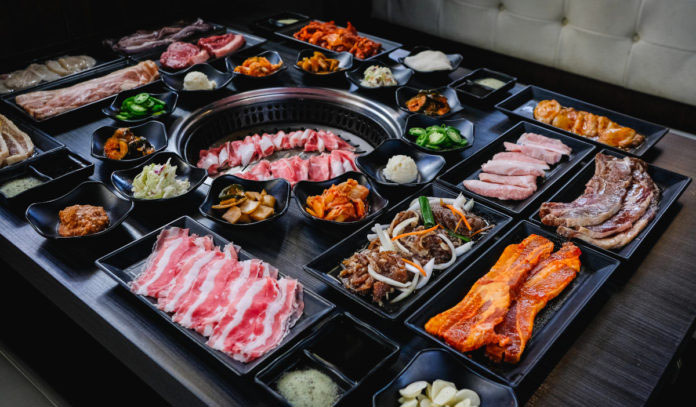
Photo Credit: Gen Korean BBQ House
Korean food and culture are deeply intertwined, reflecting a centuries old tradition shaped by geography, climate and history. From savory stews to fiery kimchi, Korean cuisine is celebrated for its bold flavors, vibrant colors and emphasis on fresh, seasonal ingredients.
At the heart of Korean food culture is the concept of “banchan,” a variety of small side dishes served alongside rice and soup. These dishes often include pickled vegetables, marinated meats and savory pancakes, providing a balance of flavors and textures that
complement the main meal.
One of the most iconic Korean dishes is kimchi, a spicy fermented cabbage dish that is staple in Korean cuisine. Made with a combination of chili pepper, garlic, ginger and other seasonings, kimchi is not only delicious but also packed with probiotics and
vitamins, making it both flavorful and nutritious.
Another beloved Korean dish is bibimbap, a colorful rice bowl topped with an assortment of vegetables, meats and a fried egg. Known for its visual appeal and customizable nature, bibimbap is a favorite comfort food that can be found in restaurants and homes throughout Korea.
Korean barbecue, or “Gogi Gui, "is another popular culinary tradition that has gained worldwide acclamation. Guests gather around a grill to cook a variety of meats, including beef, pork and chicken, which are then enjoyed with an array of dipping sauces and side dishes.
In addition to its diverse and flavorful cuisine, Korean culture is also rich in tradition and history. From the graceful movements of traditional Korean dances to the intricate art of hanbok, the traditional Korean dress, there is a deep appreciation for craftsmanship and
aesthetics in Korean culture.
Korean food and culture are also deeply rooted in the concept of “Jeong,” a unique Korean word that encompasses feelings of affection, loyalty and solidarity. Whether gathering with family for a celebratory meal or sharing a simple snack with friends, food plays a central role in fostering connections and building relationships in Korean society.
In recent years, Korean food and culture have experienced a surge in popularity around the world, thanks to the global spread of Korean pop culture or “hallyu.” From K-pop music to Korean dramas, people everywhere are embracing Korean culture and seeking out authentic Korean cuisine.
Korean food and culture are vibrant assortment of tradition, innovation and community. Whether enjoying a hearty bowl of kimchi stew or admiring the graceful movements of a traditional Korean dance, exploring Korean food and culture is a journey that delights the senses and nourishes the soul.
Email: This email address is being protected from spambots. You need JavaScript enabled to view it.
















